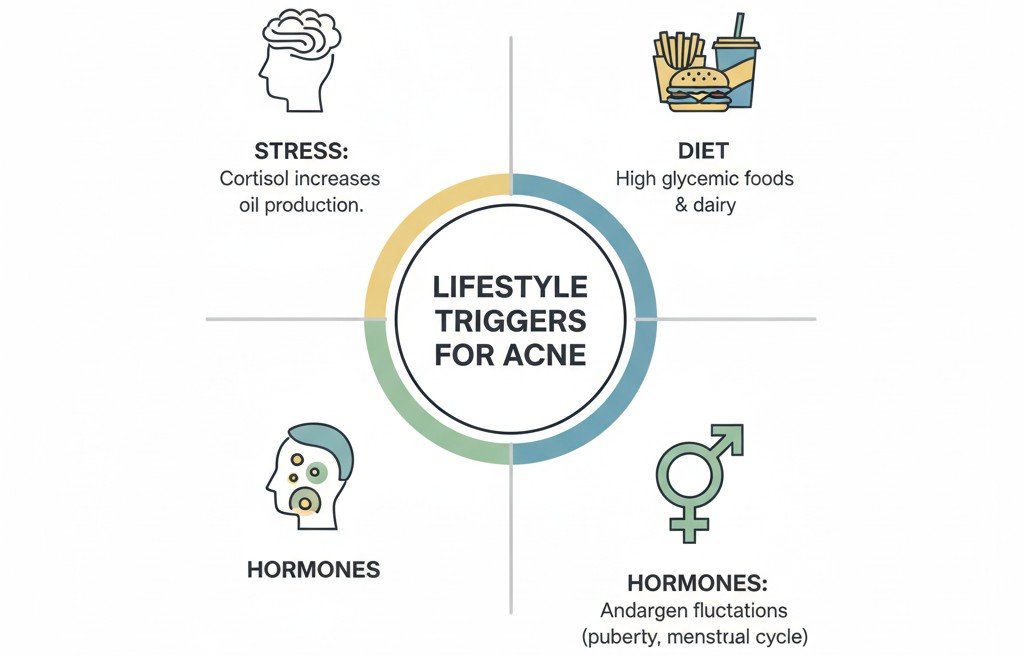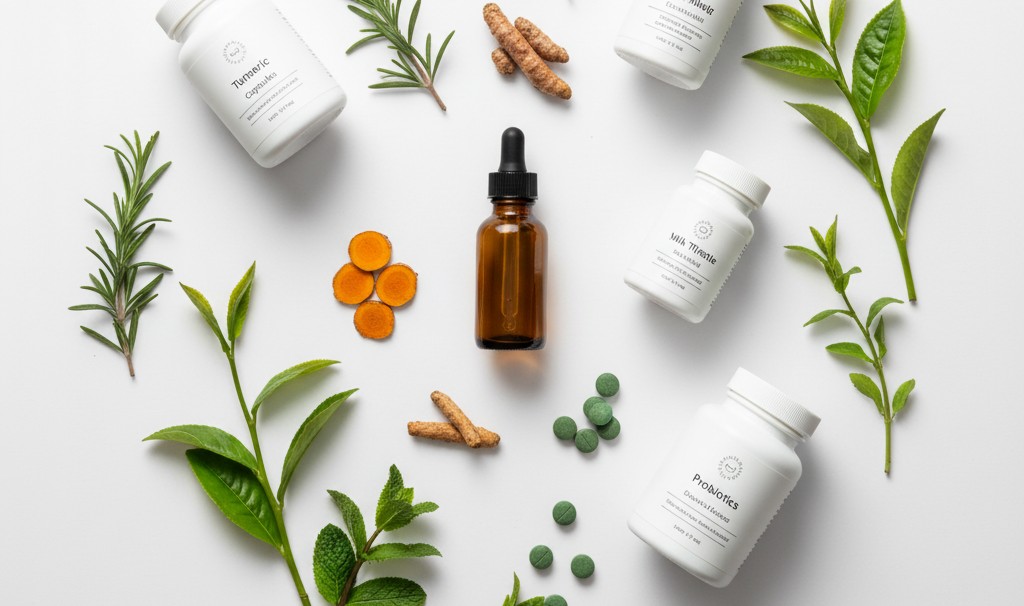Understanding the Root Causes of Acne: A Complete Guide
Acne is one of the most common skin conditions in the world, affecting people of all ages and backgrounds. While many individuals treat acne only on the surface with creams, cleansers, or spot treatments, the truth is that acne often develops because of deeper, more complex causes.
If you’ve tried countless products but still struggle with breakouts, the missing piece may be understanding the root causes of acne. Once you know why acne develops, you can address it at the source and create a sustainable plan for clear, healthy skin.
In this guide, we’ll explore the major contributors to acne: hormones, genetics, lifestyle, diet, environment, and internal imbalances. You’ll also learn how to create a strategy to target these causes, not just cover them up.
What Is Acne and Why Does It Happen?
Acne is a skin condition that occurs when hair follicles (pores) become clogged with oil (sebum), dead skin cells, and sometimes bacteria. This blockage leads to inflammation and visible lesions such as blackheads, whiteheads, papules, pustules, nodules, and cysts.
But acne isn’t just about clogged pores. It’s often the result of a chain reaction inside your body, influenced by:
-
Hormonal changes
-
Genetic tendencies
-
Dietary habits
-
Environmental factors
-
Stress and lifestyle choices
Understanding these underlying factors helps explain why acne treatments need to go beyond simple topical solutions.
Hormonal Imbalances and Acne
One of the biggest drivers of acne is hormonal fluctuation.
How Hormones Trigger Acne
Hormones regulate oil production in the skin. When androgen hormones (like testosterone) increase, they stimulate the sebaceous glands to produce more sebum. Excess oil clogs pores, creating the perfect environment for bacterial growth and inflammation.
This is why acne often appears during:
-
Puberty
-
Menstrual cycles
-
Pregnancy
-
Stressful periods
-
Hormonal disorders like PCOS (Polycystic Ovary Syndrome)
Signs Your Acne May Be Hormonal
-
Breakouts around the jawline and chin
-
Flare-ups before menstruation
-
Deep, painful cysts rather than small whiteheads
-
Acne resistant to standard over-the-counter products
To manage hormonal acne, addressing lifestyle and medical solutions (like diet, stress control, and sometimes prescribed medication) can be essential.
Learn how to balance skincare habits in Daily Skincare Routine to Eliminate Acne.
Genetic Predisposition to Acne
If your parents struggled with acne, chances are you might too. Genetics play a big role in how your skin produces oil, sheds dead cells, and responds to bacteria.
-
Some people naturally have oilier skin.
-
Others have slower skin cell turnover, which leads to clogged pores.
-
Genetic differences also affect inflammatory responses.
While you can’t change your DNA, you can change how you respond through diet, lifestyle, and consistent skincare.
Lifestyle Factors That Worsen Acne

Your daily choices may be silently worsening acne.
Stress and Acne
Stress causes your body to release cortisol, a hormone that increases oil production and inflammation. That’s why stressful events often trigger sudden breakouts.
Sleep Deprivation
Poor sleep disrupts skin repair and increases hormonal imbalances. Aiming for 7–9 hours of sleep nightly can significantly improve skin clarity.
Hygiene and Habits
-
Not washing pillowcases or makeup brushes
-
Touching your face frequently
-
Wearing tight clothing or helmets
These small habits create an environment where bacteria thrive.Discover practical changes in Lifestyle Habits That Prevent Acne Breakouts.
Diet and Acne Connection
Food has a direct effect on skin health. Studies suggest that certain foods trigger acne, while others help calm inflammation.
Foods That Worsen Acne
-
High-glycemic foods (white bread, candy, soda) spike insulin and inflammation.
-
Dairy products can increase hormonal activity.
-
Processed foods with trans fats encourage skin oil production.
Foods That Improve Acne
-
Omega-3 rich foods (salmon, flaxseed) reduce inflammation.
-
Antioxidant-rich fruits and vegetables protect against oxidative stress.
-
Probiotic foods (yogurt, kimchi, sauerkraut) balance gut health.
Read more in Nutrition and Diet Tips to Eliminate Acne Naturally.
Environmental Influences on Acne
Your environment may also play a role in breakouts.
-
Pollution: Fine particles clog pores and increase oxidative stress.
-
Climate: Hot, humid weather causes sweating and oil buildup.
-
Skincare products: Heavy or comedogenic products trap oil and bacteria.
Choosing non-comedogenic skincare and cleansing effectively can minimize environmental triggers.
Inflammation and Gut Health
Many experts now recognize the gut-skin axis: the relationship between your digestive system and your skin.
-
Poor gut health increases inflammation.
-
Imbalances in gut bacteria (dysbiosis) are linked to acne.
-
Conditions like leaky gut can trigger immune responses that show up as skin problems.
Supporting gut health with fiber, probiotics, and reduced processed foods can improve acne symptoms.
Long-Term Solutions for Targeting Root Causes
To truly eliminate acne, you need to combine strategies:
-
Balance hormones naturally (diet, exercise, stress reduction).
-
Improve gut health with probiotics and clean eating.
-
Create a consistent skincare routine with gentle, effective ingredients.
-
Avoid environmental and lifestyle triggers.
-
Seek medical advice if needed for stubborn cases.
For a complete plan, see How to Build an Acne-Free Future: Long-Term Strategies.
The Emotional Side of Acne
Acne isn’t just skin deep — it affects self-confidence, mental health, and social life. Recognizing the emotional impact is just as important as addressing the physical causes. Support groups, therapy, or mindfulness practices can help reduce the stress-acne cycle.
FAQs About the Root Causes of Acne
Can acne be 100% cured?
Acne can be managed and minimized to the point of clear skin, but recurrence depends on genetics, lifestyle, and hormonal balance.
Does acne only affect teenagers?
No — adult acne is increasingly common due to stress, hormonal changes, and environmental triggers.
Are natural remedies enough?
Sometimes, but for severe acne, combining natural strategies with medical treatment is often most effective.
Final Thoughts
The root causes of acne go beyond clogged pores. From hormones and genetics to lifestyle and diet, acne is a complex condition that requires a comprehensive strategy. By understanding what’s driving your acne, you can make informed choices that create lasting results.
Clear Your Skin from the Inside Out

If you’re ready to tackle acne at the root level, consider trying Zinamax — a natural supplement designed to:
-
Support hormonal balance
-
Reduce inflammation
-
Improve skin hydration and elasticity
-
Strengthen your body’s natural defenses against acne
Thousands have already improved their skin health with Zinamax. Take the first step toward clear, confident skin today.







